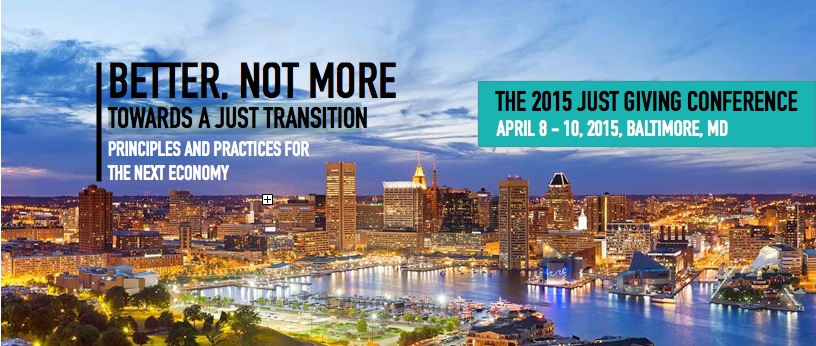
Better, Not More: A Reflection On My Third Edge Conference
Last week I attended the Edge Funders Alliance’s Just Giving Conference. The conference this year was entitled Better, Not More Towards a Just Transition: Principles and Practices for the Next Economy. While on a process level it didn’t hit all of the points Pia highlighted in her recent post about the Art of the Un-Conference, it did provide a mix of plenary talks, session workshops, engagement labs, small group dialogues, and informal conversations — as well as a movie night and a creative performance at Red Emma’s Bookstore — that stretched my thinking and sparked new connections.
The conference program read, “With your active participation and the support of allies from around the world, Just Giving provides a unique space to better understand how grassroots communities and transnational movements are responding to global challenges, and how our grantmaking practices can make a difference.”
This was my third Edge conference and my experience at all three is that these gatherings do provide a different – and needed — space for learning, analysis and reflection than is found at most philanthropic gatherings.
There was much talk in Baltimore about the systemic and interconnected nature of the social, ecological, and economic crises facing us – and the enormity of those crises can feel overwhelming. That’s why it was helpful and hopeful to hear from grassroots leaders working on the front lines of change in local communities around the world. Their stories grounded the “big picture” discussions for me in fundamentally important ways.
It seems obvious I know, but I left the gathering thinking about what a big, wide world it is and how humbling and inspiring it was to hear from changemakers moving forward in an array of contexts with both passion and compassion – and often against great odds.
Though I’m still digesting the smorgasbord of ideas and stories the gathering offered, while they are fresh I want to raise up some of the major themes and questions that arose over the three days of the conference.
In terms of themes, here are four that were synthesized and presented to the group at the conference’s close:
- We need to build a broader, more inclusive movement within philanthropy with a shared agenda. We need to take risks and develop audacious, big responses to the structural, economic, and ecological crises we face.
- System change starts with a movement that respects all diversity; promotes social equity and inclusion; and fights against a patriarchal system.
- We are working on similar issues but calling them different names. Let’s unify our language, amplify our storytelling, and develop a common vocabulary.
- We need to develop a tangible model of a new economy that shifts economic control to the people and builds community wealth. We need to build confidence that “better” is possible.
Now, how to act on these broad themes raises a lot of questions for the Edge community of funders, donors, and allies. Here are some of the ones that were posed that stick with me:
- Is Edge as powerful as we can be as a community?
- Can we think differently about how we come together?
- Can funders really collaborate?
- How does philanthropy support the dialogue of emerging movements?
- How do we create a culture shift in philanthropy that moves from the transactional to the transformational?
- How do we call people in rather than calling them out?
- Why don’t we engage in collective advocacy more?
- How do we create a sense of urgency within philanthropy?
- How do we shift the narrative?
One thing that strikes me about these questions is that they are ones I have heard at gatherings of other affinity groups as well. And that often the importance of relationships is a theme that ties them together.
So, here are a few more questions I continue to sit with:
Can funders who are working on different issues and in different contexts or places, but who have shared values around the importance of process and relationships, come together in a way that builds collective power around advocating for fundamental changes in philanthropic practice?
Is there a way for affinity groups to more intentionally connect and collaborate about the importance of how we fund – and in so doing help shift the culture and narrative of philanthropy?
By explicitly connecting across “how” we do our work, might we increase our ability to serve the emergence of the cross-issue, cross-sector movements that are working to create the future today?